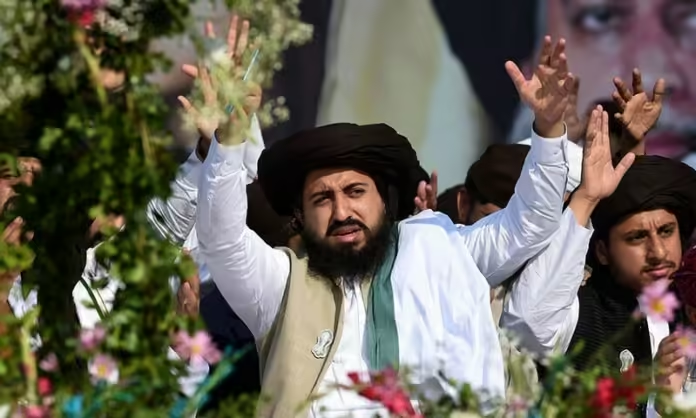Tehreek-e-Labbaik Pakistan chief Saad Hussain Rizvi announced long march from Lahore to Islamabad “Martyrdom Is Our Destiny”
At the historic Jamia Masjid-e-Rehmat-ul-Ameen in Lahore, the atmosphere was charged with emotion and intensity as Amir Saad Hussain Rizvi, the leader of Tehreek-e-Labbaik Pakistan (TLP), delivered a bold address during the Friday congregation. Known for his fiery rhetoric and unwavering stance on religious and national issues, Rizvi’s speech took a sharp turn toward political confrontation, marking another chapter in TLP’s ongoing struggle against what it calls “government hypocrisy and international pressure.”
Rizvi publicly criticized the federal government for questioning its diplomatic relations and policies towards the Palestine conflict. In a surprising comment, he rhetorically asked, “What hand have you shaken with Trump to support Palestine in Pakistan?” — a rhetorical punch against what he sees as hypocrisy in Pakistan’s foreign policy.
TLP’s Call for Action: March to Islamabad
Soon after his fiery criticism, Saad Hussain Rizvi issued a strong statement that has already set political circles in the country buzzing. The TLP leader announced that his party will hold a Lahore to Islamabad long march, an action likely to attract thousands of supporters and place undue pressure on the federal government.
Rizvi claimed that he would himself head the procession, followed by members of the TLP Shura and then the party’s committed workers. His statement resonated within the mosque when he proclaimed, “Arrest, bullet, and shell are no problem. Martyrdom is our destiny.”
The claim was accompanied by slogans and chants from his workers, who vowed allegiance and preparedness to follow their leader at all costs.
A Defiant and Faith-Based Movement
For many of those in TLP’s ranks, the message of Rizvi is not political — it’s religious. The code of sacrifice and resilience against state repression had been part of the ideology of the group for long. By playing on the notion of martyrdom, Rizvi upheld the message that their movement is beyond politics and enters the domain of religion and obligation.
Witnesses observe that TLP’s marches in the past were crucial in framing political rhetoric in Pakistan, and they have often goaded the government into talks. This time around, though, the call is heavier in tone — one that combines religious belief with political rebellion.
Government on Alert: Brewing Tensions Ahead
Ahead of the long march, political observers anticipate increased tension between the government and the leadership of TLP. Past protests by TLP have resulted in mass scale disruptions and violence, creating worries about public safety and the readiness of law enforcement.
Security forces are said to be weighing potential routes and tactics to keep the peace, and political analysts say that this march may again challenge the government to reconcile freedom of speech with national stability.
A Showdown on the Horizon
As Saad Hussain Rizvi gets ready to spearhead the Lahore to Islamabad long march, the country is on the edge of its seat. His announcement has set off a series of debates — ranging from street corners to TV studios — regarding the future of political opposition, religious activism, and public order in Pakistan.
Whether this march becomes a turning point or another episode in Pakistan’s cycle of protest politics remains to be seen. But one thing is certain: Saad Hussain Rizvi’s long march has already captured the attention of the public and rekindled debates about faith, leadership, and resistance in the country’s turbulent political landscape.
Visit Pakistan Updates for more breaking news and stories from across the nation.




